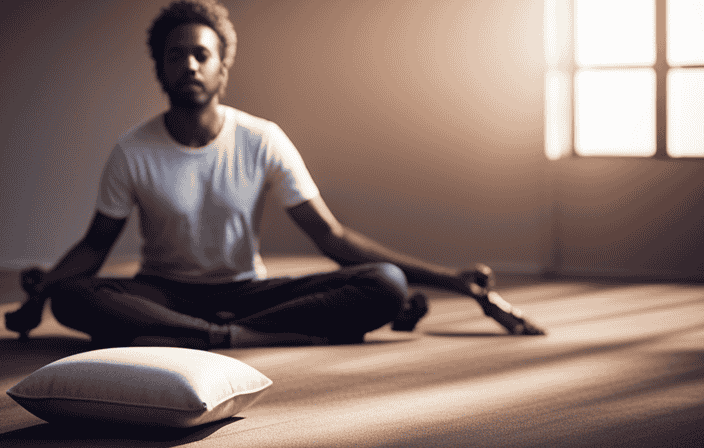In today’s fast-paced and demanding world, students encounter numerous obstacles that may impede their success. Yet, there is a powerful tool that can unleash their full potential and lay the foundation for academic achievement and personal development: meditation.
This age-old practice, often overlooked and underestimated, holds the key to unlocking a student’s true potential. By cultivating a sense of calm and focus, meditation empowers students to navigate the complexities of their academic journey with grace and resilience.
In this article, we will explore the transformative benefits of meditation and how it can be the catalyst for student success.
Key Takeaways
- Improved attention and focus, leading to better outcomes and task performance.
- Stress reduction and coping mechanisms to manage the pressure and demands of student life.
- Boosted self-esteem and well-being, promoting a positive mindset and emotional competence.
- Enhanced resilience and social skills, enabling students to adapt to challenges and interact effectively with others.
Benefits of Meditation
Meditation has been shown to improve attention and focus, reduce stress levels, boost self-esteem and well-being, and enhance exam preparation and performance, making it a key practice for student success.
By regularly practicing meditation, students can improve their cognitive abilities and promote emotional stability. It is no secret that the average human mind is often lost in thought, leading to sadness, depression, fear, and anxiety. However, meditation helps center thoughts on important things, allowing students to block out distractions and improve their focus and attention.
Additionally, mindfulness meditation lowers cortisol levels, promoting relaxation and clarity, which in turn reduces stress levels. By decluttering the mind and promoting self-identity, meditation also enhances self-esteem and emotional competence.
Overall, meditation is a powerful tool that can greatly benefit students in their journey to success.
Improving Attention and Focus
Improving attention and focus has been shown to enhance academic performance and increase productivity.
In today’s fast-paced world, it’s easy to get distracted by countless things vying for our attention. However, through the practice of meditation, we can train our minds to stay focused and centered on the task at hand.
By blocking out distractions and honing our ability to concentrate, we can improve our cognitive abilities and achieve better results in our studies.
Regular meditation not only enhances our attention span, but it also promotes understanding and efficient task performance. It helps us develop single-mindedness and longer concentration ability, making it easier to complete tasks and solve complex problems.
By incorporating meditation into our daily routine, we can harness the power of a focused mind and increase our productivity in all areas of life.
Reducing Stress and Coping
Feeling overwhelmed with stress and finding healthy coping mechanisms is crucial for maintaining a balanced lifestyle. In today’s fast-paced world, students often find themselves facing high levels of stress. However, incorporating relaxation techniques, such as meditation, can significantly reduce stress and promote emotional regulation.
Here are three reasons why meditation is an effective tool for reducing stress and coping:
-
Mindfulness: By practicing meditation, students can cultivate a sense of mindfulness, allowing them to be fully present in the moment and let go of worries and anxieties. This helps to reduce stress and promote a sense of calmness.
-
Stress Reduction: Regular meditation has been shown to lower cortisol levels, which is the hormone responsible for stress. By engaging in meditation, students can effectively reduce their stress levels and improve their overall well-being.
-
Emotional Regulation: Meditation provides students with a space to acknowledge and process their emotions in a healthy way. It helps them develop the skills to regulate their emotions and respond to stressful situations with greater resilience and composure.
Incorporating meditation into daily routines can provide students with valuable tools to manage stress and cope with the challenges they face.
Boosting Self-Esteem and Well-Being
Boosting self-esteem and well-being is essential for personal growth and a positive mindset. Meditation provides a powerful tool to cultivate self-acceptance and emotional stability.
By taking the time to sit in stillness and observe our thoughts and emotions without judgment, we develop a deeper understanding of ourselves. This practice allows us to let go of negative self-talk and embrace our inherent worthiness.
Through meditation, we create space for self-reflection and self-care, which are vital for maintaining emotional well-being. By connecting with our breath and grounding ourselves in the present moment, we develop a sense of inner peace and calm. This inner peace radiates outward, positively impacting our relationships and interactions with others.
Regular meditation also enhances our ability to handle challenging situations with grace and resilience. It equips us with the tools to navigate through life’s ups and downs, fostering a sense of confidence and empowerment.
By prioritizing our mental and emotional well-being through meditation, we lay the foundation for a fulfilling and successful academic journey.
Enhancing Exam Preparation and Performance
Enhancing exam preparation and performance allows me to approach tests with confidence and focus. By incorporating mindfulness techniques and concentration techniques into my study routine, I am able to optimize my learning experience and improve my overall performance. Here are four key strategies that have proven to be effective for me:
-
Mindful Breathing: Taking a few moments to focus on my breath before starting my study session helps me calm my mind and increase my concentration. It allows me to let go of distractions and fully engage with the material.
-
Visualization: Visualizing myself successfully completing the exam boosts my confidence and motivation. I imagine myself confidently answering each question, which helps alleviate any test anxiety.
-
Time Management: Creating a study schedule and sticking to it helps me stay organized and ensures that I cover all the necessary material. This prevents last-minute cramming and allows for thorough understanding of the topics.
-
Practice Tests: Taking practice tests under simulated exam conditions helps me familiarize myself with the format and timing of the actual test. It also allows me to identify any weak areas that need further improvement.
By incorporating these mindfulness and concentration techniques, I am able to enhance my exam preparation and perform at my best.
Developing Resilience and Social Skills
Developing resilience and social skills through mindfulness practices has allowed me to navigate challenging situations with grace and build stronger connections with others. By incorporating meditation into my daily routine, I have been able to cultivate emotional intelligence and gain a deeper understanding of my own emotions and reactions.
This self-awareness has enabled me to respond to difficult circumstances with a calm and composed demeanor, rather than being overwhelmed by stress or negativity. Additionally, meditation has enhanced my ability to build healthy relationships with those around me. Through mindful breathing and focused attention, I have learned to truly listen and empathize with others, fostering greater understanding and connection.
The practice of meditation has undoubtedly played a crucial role in my personal growth and has equipped me with the skills necessary to thrive in both my academic and social endeavors.
Now that we have explored the benefits of meditation in developing resilience and social skills, let us delve into another aspect of its impact on student success.
Meditation has been found to play a crucial role in improving memory retention, enhancing creativity, and problem-solving skills. As a student, I have experienced firsthand how meditation can boost my ability to remember and recall information during exams and assignments.
By calming the mind and reducing stress, meditation creates an optimal environment for learning and retaining new information. Additionally, the practice of meditation stimulates creativity and enhances problem-solving abilities by fostering a clear and focused mindset.
It allows for the exploration of innovative ideas and the development of unique solutions to academic challenges. Incorporating meditation into our daily routine can truly unlock our full potential as students, leading to greater success in our academic endeavors.
Frequently Asked Questions
How long do you need to meditate each day to see the benefits?
To see the benefits of meditation, I recommend meditating for at least 10-15 minutes each day. Consistency is key in reaping the rewards of improved attention, reduced stress, enhanced self-esteem, and better exam performance.
Can meditation replace other study techniques for improving focus and attention?
Meditation can be a powerful tool for improving focus and attention, but it should not replace other study techniques. It complements traditional methods and can enhance their effectiveness by promoting a calm and focused mindset.
Are there any specific meditation techniques that are more effective for reducing stress?
Different breathing techniques, such as deep breathing and box breathing, can be effective for reducing stress. Both mindfulness and guided meditation can help with stress reduction, but it’s important to find the technique that works best for you.
How long does it take to start experiencing an improvement in self-esteem through meditation?
In my experience, the timeline for experiencing an improvement in self-esteem through meditation can vary. It may take a few weeks or even months of regular practice to notice a significant boost in self-esteem.
Can meditation help with test anxiety and performance anxiety during exams?
Meditation can be incredibly helpful in managing test anxiety and performance anxiety during exams. By practicing mindfulness and focusing on the present moment, meditation can reduce stress and improve concentration, leading to better performance.
Conclusion
After exploring the numerous benefits of meditation for student success, it’s clear that incorporating this practice into our daily routines is essential.
The power of meditation to improve attention and focus, reduce stress, boost self-esteem, and enhance exam preparation is truly remarkable.
It allows us to navigate the challenges of student life with ease and grace, while developing resilience and essential social skills.
So, let us embrace meditation as the key that unlocks our full potential, guiding us towards a future filled with success and fulfillment.
Its impact is simply out of this world.









